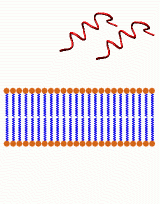Václav Čeřovský
 |
Antimicrobial PeptidesWith the increasing occurrence of antibiotic resistance among key bacterial pathogens, there is an urgent need to discover novel classes of antibacterial agents. Antimicrobial peptides (AMPs) provide a new path for developing medicines to fight bacterial infections. Antimicrobial peptides are gene-encoded, ribosomally synthesized molecules. They are considered to be the effector molecules of innate immunity, acting as a first line of defense against bacterial infections by perturbing the phospholipid bilayer of the target cell membrane, interfering with metabolism or targeting cytoplasmic components. The natural AMPs have been isolated and characterized from practically all living organisms, ranging from prokaryotes to humans. The significant advantage of AMPs resides in the global mechanism of their action, which is remarkably different from that of conventional antibiotics, they kill bacteria very rapidly. Antimicrobial resistance is less likely to be developed since bacteria have no weapon against this physical mechanism of action. The focus of our very recently established research team is characterization of novel AMPs isolated from insect and the design and synthesis of their analogues aiming at obtaining molecules potentially applicable in the therapy. |